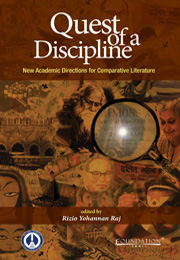Book contents
- Frontmatter
- Contents
- List of Contributors
- Acknowledgements
- Prologue to the “Quest'
- Introduction
- PART I Traditions and Manifestoes: Reflecting on Perspectives
- 1 The Comparatist as Teacher: Teaching Indian Literatures through a Comparative Methodology
- 2 Comparative Literature: Methodology and Challenges in Europe with Special Reference to the French and German Contexts
- 3 ‘Lone Starring’ Comparative Literature in US English Departments
- PART II The Quest Motif: Redefining the Scope of Comparative Literature
- PART III The Dynamics of Exchange: Genres, Areas and Disciplines
- PART IV India: A Curious Comparative Space
- Afterword: Comparative? Literature?
- Index
1 - The Comparatist as Teacher: Teaching Indian Literatures through a Comparative Methodology
from PART I - Traditions and Manifestoes: Reflecting on Perspectives
Published online by Cambridge University Press: 05 June 2012
- Frontmatter
- Contents
- List of Contributors
- Acknowledgements
- Prologue to the “Quest'
- Introduction
- PART I Traditions and Manifestoes: Reflecting on Perspectives
- 1 The Comparatist as Teacher: Teaching Indian Literatures through a Comparative Methodology
- 2 Comparative Literature: Methodology and Challenges in Europe with Special Reference to the French and German Contexts
- 3 ‘Lone Starring’ Comparative Literature in US English Departments
- PART II The Quest Motif: Redefining the Scope of Comparative Literature
- PART III The Dynamics of Exchange: Genres, Areas and Disciplines
- PART IV India: A Curious Comparative Space
- Afterword: Comparative? Literature?
- Index
Summary
INTRODUCTION
To begin with, let us reflect upon the history of this inter-text laden title; the discerning reader will have identified the texts already. The main title is an invocation to the grand old man of non-British literature in English, Chinua Achebe, whose essay ‘The Novelist as Teacher’(1965) first pointed out the dilemma of the writer as ‘teacher’, specifically of English, that great power language in the colonies. He remembers being asked by a reader to include question-and-answer models at the back of his pioneering novel Things Fall Apart (1958) so that it is easy for students preparing to pass examinations in English, which doubtless would qualify them for lucrative jobs and prestige in newly independent ex-colonies of the British Empire. However, that was a different context, though born out of the same dilemma of the academician in a non-English ex-English colony. The present essay is a statement of a problem arising partially out of the ‘problem’ of English in multilingual societies like Nigeria and India, where English is just another language with a rather heavy baggage. Turning the focus on the non-English cultures of this sort of multicultural, multilingual ‘nation’, we will begin by asking, what the ‘task’ of the ‘teacher’ of a particular discipline is, across a temporal and spatial interval. Posing this question in the title, we attempt to search for the materials of an answer. The subtitle offers a proposal for the reading of Indian literatures, formed by the many ‘other’ languages as well as ‘English’, through the use of comparative methodology.
- Type
- Chapter
- Information
- Quest of a DisciplineNew Academic Directions for Comparative Literature, pp. 13 - 28Publisher: Foundation BooksPrint publication year: 2012
- 1
- Cited by

